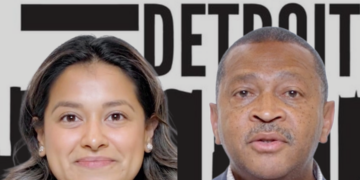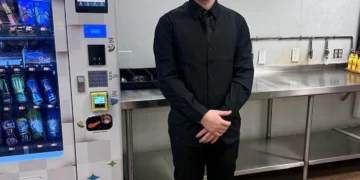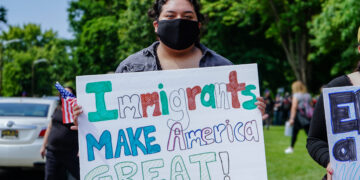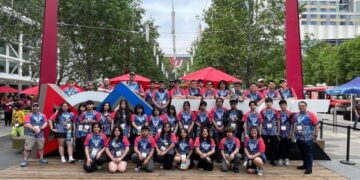The Southwest Detroit Community Justice Center is the first community court in Detroit and the only one in Michigan. This community court aims to increase public trust in the justice system while reducing crime and incarcerations while improving residents’ quality of life.
Founded in 2013, the SWDCJC works with people accused of low-level, non-violent offenses committed in ZIP codes 48209, 48210, 48216, and 48217. This program allows offenders to give back to the community through visible community service such as boarding up vacant homes, cleaning local parks, and sweeping the streets as an alternative to hefty fines or jail time.
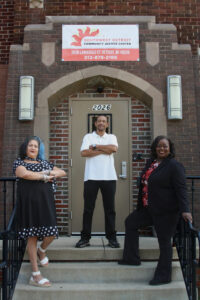
Led by CEO LaNeice Jones, the organization offers people the opportunity to hold their hearings and resolve their infractions within the community instead of traveling to downtown Detroit’s 36th District Court. Offenders can choose to go through the traditional court process, which can stay on their record, or participate in the program and potentially clear their offense.
“By incorporating principles of procedural justice, decision-makers remain neutral, fair, and compassionate, treating defendants with dignity and respect,” Jones said.
Many participants face underlying hardships contributing to their offenses, including mental health issues, domestic violence, homelessness, unemployment, and human trafficking. To combat this, the center provides wraparound services to avoid recidivism by addressing those underlying challenges.
The center not only serves individuals with misdemeanor offenses but also offers its wraparound services to any community member in need, regardless of their involvement with the legal system.
Making a difference
In Southwest Detroit, solicitation of prostitution is acknowledged as a community issue, and the SWDCJC addresses it through its Prostitution Offenders Program. The program takes an educational approach to help individuals understand the broader implications of their actions, focusing on human trafficking awareness and personal accountability, while also providing essential health screenings such as STD testing.
Tackling crime extends to the center’s youth-focused initiatives, like the Detroit Youth Grow program. DYG engages young people in the area, providing them with the skills needed to resolve conflict peacefully, access job opportunities, and practice restorative healing.
Jones, a Detroit native, leads the center with a focus on its mission.
Initially aspiring to be a doctor, her path shifted during her undergraduate years at the University of Michigan, influenced by a school counselor and her involvement in Project Service, a service-learning initiative. Jones obtained a master’s degree in social work and has extensive experience in the criminal justice system. In 2019, she joined the SWDCJC, where she has worked to expand the center’s reach and impact.
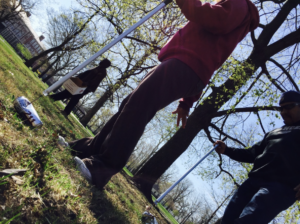
Success stories
Jones proudly shared success stories involving program participants, on the condition of anonymity.
A Southwest Detroit resident who traveled to Kentucky for work received a traffic violation in Hartford, Kentucky. He faced the risk of job loss, deportation, or jail due to his limited English proficiency and the lack of a translator in the local court system.
Upon learning of his situation, the SWDCJC stepped in to advocate for him. The organization contacted the county court clerk, explaining the center’s program and requesting that the participant be allowed to attend his court date virtually to avoid missing work.
Over two weeks, staff persistently followed up with the court and successfully secured a waiver for an in-person appearance, as well as a reduction in his fine. He resolved his legal issues without jeopardizing his employment and immigration status.
“The SWDCJC has really helped me,” he said. “The help they provided made my life so much better and easier. I now recommend the center to others in difficult situations.”
Another inspiring story is of a 30-year-old man from Guatemala who faced hurdles due to language barriers and a legal situation concerning his driver’s license. The SWDCJC aided him not only legally but also by connecting him with services to address his mental health and substance abuse issues and assisting him in applying for employment at a local supermarket, which he successfully obtained.
Challenges ahead
Despite its successes, the center faces significant challenges. The COVID-19 pandemic hit the organization hard, leading to funding shortfalls and a reduction in staff from seven to three full-time employees. This downsizing has made it difficult to maintain services and expand outreach efforts.
“We are a small but mighty organization,” Jones said. “The biggest challenge is sustaining funding and getting the word out about what the organization does.”
Funding for the center comes from sources like the Flinn Foundation, MiSide, and the Michigan Department of Justice, particularly for newer programs. However, the need for more consistent and diverse funding streams remains critical.
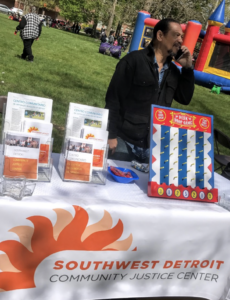
The center plans to introduce two new programs: a Community Violence Intervention program aimed at reducing local violence and a Sexual Assault Program specifically supporting Latina and African American women.
Jones emphasizes the importance of integrating more mental health support into their services, recognizing the significant impact even short-term counseling can have on individuals’ recovery and rehabilitation.
A brighter future
By linking individuals and their legal challenges to essential community resources like food, housing, and job assistance, the SWDCJC addresses the multifaceted nature of justice and rehabilitation.
“I envision a future where the SWDCJC’s impact extends even further, fostering a more inclusive and prosperous Detroit,” Jones said. “Through dedicated community engagement and innovative strategies, the center will continue to be a transformative force, bringing hope and healing to all residents.”
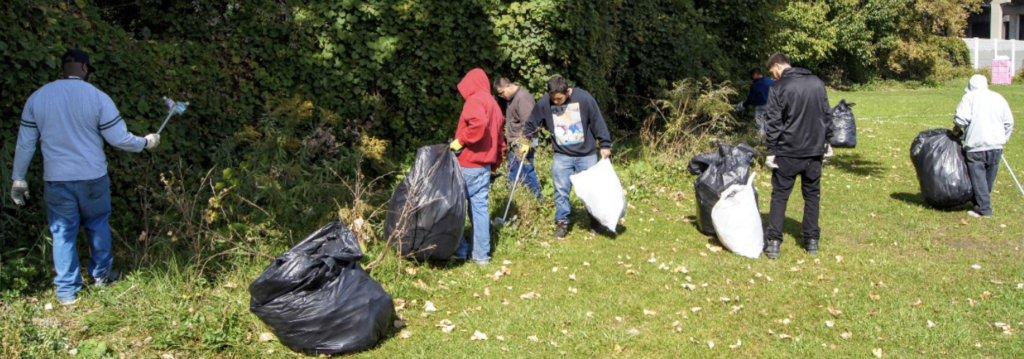
SWDCJC serves the community at 2026 Lawndale St, Detroit, MI 48209, and is open Monday through Friday, 9am to 5pm. It can be reached at (313) 879-2155.
Maxima Oxholm Barraza is a second-year student at Oberlin College interested in pursuing law school.
Tribunal Comunitario: Faro de Justicia en Detroit
El Centro de Justicia Comunitaria del Suroeste de Detroit (SWDCJC, por sus siglas en inglés) es el primer tribunal comunitario en Detroit y el único en Michigan. Este tribunal comunitario tiene como objetivo aumentar la confianza pública en el sistema judicial, reducir el crimen y las encarcelaciones, y mejorar la calidad de vida de los residentes.
Fundado en 2013, el SWDCJC trabaja con personas acusadas de delitos menores y no violentos cometidos en los códigos postales 48209, 48210, 48216 y 48217. Este programa permite a los infractores devolver a la comunidad mediante servicio comunitario visible, como cubrir ventanas de casas abandonadas, limpiar parques locales y barrer las calles, como una alternativa a multas elevadas o tiempo en la cárcel.

Bajo la dirección de la CEO LaNeice Jones, la organización ofrece a las personas la oportunidad de llevar a cabo sus audiencias y resolver sus infracciones dentro de la comunidad en lugar de asistir al tribunal 36th Distritc Court del centro de Detroit. Los infractores pueden optar por pasar por el proceso judicial tradicional, que puede permanecer en su historial, o participar en el programa y potencialmente borrar su infracción.
“Al incorporar principios de justicia procesal, los tomadores de decisiones permanecen neutrales, justos y compasivos, tratando a los acusados con dignidad y respeto”, dijo Jones.
Muchos participantes enfrentan dificultades que contribuyen a delitos, incluyendo problemas de salud mental, violencia doméstica, falta de vivienda, desempleo y trata de personas. Para combatir esto, el centro ofrece servicios integrales para evitar la reincidencia abordando esos retos.
El centro no solo atiende a individuos con delitos menores, sino que también ofrece sus servicios integrales a cualquier miembro de la comunidad que lo necesite, independientemente de su involucramiento con el sistema legal.
Haciendo la diferencia
En el suroeste de Detroit, la solicitud de prostitución es reconocida como un problema comunitario, y el SWDCJC lo aborda a través del programa de infractores de prostitución. El programa adopta un enfoque educativo para ayudar a las personas a comprender las implicaciones más amplias de sus acciones, centrándose en la concienciación sobre la trata de personas y la responsabilidad personal, al mismo tiempo que proporciona exámenes de salud esenciales como pruebas de enfermedades de transmisión sexual.
El combate al crimen incluye iniciativas centradas en los jóvenes, como el programa Detroit Youth Grow (DYG, por sus siglas en inglés). DYG involucra a los jóvenes del área, proporcionándoles las habilidades necesarias para resolver conflictos pacíficamente, acceder a oportunidades de empleo y practicar la sanación restaurativa.
Jones, originaria de Detroit, lidera el centro centrada en su misión.
Inicialmente aspirando a ser doctora, su camino cambió durante sus años de licenciatura en la Universidad de Míchigan, influenciada por un consejero escolar y su participación en Project Service, una iniciativa de aprendizaje-servicio. Jones obtuvo una maestría en trabajo social y tiene una amplia experiencia en el sistema judicial penal. En 2019, se unió al SWDCJC, donde ha trabajado para expandir el alcance y el impacto del centro.

Historias de éxito
Jones compartió orgullosamente historias de éxito involucrando a participantes del programa, bajo la condición de anonimato.
Un residente del suroeste de Detroit que viajó a Kentucky por trabajo recibió una infracción de tráfico en Hartford, Kentucky. Enfrentaba el riesgo de perder su trabajo, deportación o encarcelamiento debido a su limitado dominio del inglés y la falta de un traductor en el sistema judicial local.
Al enterarse de su situación, el SWDCJC intervino para abogar por él. La organización contactó al secretario del tribunal del condado, explicando el programa del centro y solicitando que se permitiera al participante asistir a su fecha de corte virtualmente para evitar perder el trabajo.
Durante dos semanas, el personal siguió insistentemente con el tribunal y logró asegurar una exención para la aparición en persona, así como una reducción en su multa. Resolvió sus problemas legales sin poner en riesgo su empleo y su estatus migratorio.
“El SWDCJC realmente me ha ayudado”, dijo. “La ayuda que me brindaron hizo mi vida mucho mejor y más fácil. Ahora recomiendo el centro a otros en situaciones difíciles”.
Otra historia inspiradora es la de un hombre de 30 años de Guatemala que enfrentaba obstáculos debido a barreras lingüísticas y una situación legal relacionada con su licencia de conducir. El SWDCJC lo ayudó no solo legalmente, sino también conectándolo con servicios para abordar sus problemas de salud mental y abuso de sustancias, y asistiéndolo en la aplicación para un empleo en un supermercado local, el cual obtuvo con éxito.
Desafíos por delante
A pesar de sus éxitos, el centro enfrenta desafíos significativos. La pandemia de COVID-19 afectó duramente a la organización, llevando a una escasez de fondos y una reducción en el personal de siete a tres empleados a tiempo completo. Esta reducción ha dificultado el mantenimiento de los servicios y la expansión de los esfuerzos de alcance comunitario.
“Somos una organización pequeña pero poderosa”, dijo Jones. “El mayor desafío es mantener el financiamiento y dar a conocer lo que hace la organización”.
La financiación para el centro proviene de fuentes como la Fundación Flinn, MiSide y el Departamento de Justicia de Míchigan, particularmente para programas más recientes. Sin embargo, la necesidad de fuentes de financiamiento más consistentes y diversificadas sigue siendo crítica.
El centro planea introducir dos nuevos programas: un programa de intervención en la violencia comunitaria dirigido a reducir la violencia local y un programa de asalto sexual que apoya específicamente a mujeres latinas y afroamericanas.

Jones enfatiza la importancia de integrar más apoyo de salud mental en sus servicios, reconociendo el impacto significativo que incluso el asesoramiento a corto plazo puede tener en la recuperación y rehabilitación de las personas.
Un futuro más brillante
Al vincular a las personas y sus desafíos legales con recursos comunitarios esenciales como alimentos, vivienda y asistencia laboral, el SWDCJC aborda la naturaleza multifacética de la justicia y la rehabilitación.
“Visualizo un futuro donde el impacto del SWDCJC se extienda aún más, fomentando un Detroit más inclusivo y próspero”, dijo Jones. “Mediante un compromiso comunitario dedicado y estrategias innovadoras, el centro continuará siendo una fuerza transformadora, brindando esperanza y sanación a todos los residentes”.





